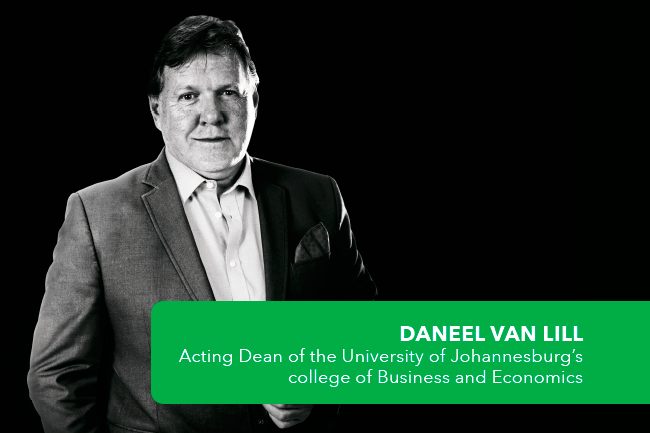The continent’s aim of achieving economic growth of some 5% before 2020 depends on connecting African economies to one another, and to those of Asia, Europe and the rest of the world. This is according to research undertaken by globally ranked academics and executive-level university administrators, motivated by the University of Johannesburg (UJ), which wanted to establish how the institution, in growing its global identity as a new-generation university of choice anchored in Africa, can continuously deliver its strengths in serving pan-African ideals.
Professor Daneel van Lill, Acting Dean of UJ’s College of Business and Economics, explains that despite the business faculty accommodating some 19 500 full-time and 6 600 continuing-education enrolments in qualifications serving private and public-sector management, and accounting for 45% of the institution’s graduate output with a 93% employment rate, the university wanted to deepen its understanding of what it would take to become an internationally recognised provider of management education.
The study selected 49 university-based schools, 19 independent schools, 21 schools contained in the Universitas 21 network of research-driven universities, and five South African business schools from the global population of 12 623 providers of management and finance education. ‘All of these were considered within UJ’s long-term strategic reach,’ says Van Lill.
The researchers realised early on that by using the outdated term ‘faculty’ to identify UJ’s various study offerings, the university’s business and management disciplines would not achieve as much global recognition if it did not move to the trend of presenting itself as a business school. ‘This would be a strategic move in that there is an increasing number of new business schools in Africa, many rooted from well-established European or North American business schools,’ says Van Lill. ‘This made us ask the question of how quality educational offerings would influence an increasingly competitive environment, especially given the flow of management postgraduates out of the continent to international destinations.
‘From data drawn from the likes of Africa Competitiveness and other World Economic Forum reports and ILO statistics, we understand that Africa needs more trade than aid and consequently more competent managers to manage and lead the flow of goods and services in the form of international trade, financial integration via the movement of capital, the flow of knowledge and information, and the flow of movement of people, inclusive of tourists, international students and highly skilled workers.’
Van Lill adds that ‘crunching numbers revealed that an 11 million management workforce needs to be educated’ – one million of them at master’s level.
The study also revealed that despite 89 African institutions offering masters of management equivalents, at current capacity it could take up to 22 years to educate enough managers. ‘Of all providers of management education in Africa, only 18 carry some form of accreditation,’ says Van Lill. ‘And only three have the coveted triple accreditation of AACSB, AMBA and EQUIS.’ These are global organisations that recognise educational quality and professional development.
The study revealed more. When relating the findings to demand and supply of management education in global and African emerging economies, it was evident that the drive for ‘quality’ serves as a clear differentiator.
‘We then interrogated the term “quality” to ensure that UJ could align its top five strengths in economics and management education to a macro structure to support our ambition and ability to drive socio-economic transformation and global best practice in business and economics education,’ he says.
The first of the five, to deliver on the impact of advances in ICT, presented two perspectives – student and employer. Students need the ability to deliver on personalised development and blended learning expectations while employers need to deliver graduates able to deal with the impact of artificial intelligence on the competition, digital reinvention and people skills. The second strength lies in balancing shareholder/stakeholder interests in curricula in the context of the UN’s Sustainable Development Goals, while the third strength is focused on the differentiation among competitors, notably global rankings and accreditations, especially that coveted triple accreditation. Fourth is having the intellectual capacity to interpret politics and socio-economic shifts and, fifth, being able to contribute to the global debate on the legitimacy of management education.
The result was the launch of the College of Business and Economics at UJ’s campus in Johannesburg in July this year, housing six schools that meet the demand and supply of capable managers and leaders in Africa. Those schools are the Johannesburg Business School; the School of Accounting; the School of Consumer Intelligence and Information Systems; the School of Economics; the School of Public Management, Governance and Public Policy; and the School of Tourism and Hospitality.
‘The new structure enables the combination of substantial and well-established programmes serving both the private and public sector,’ says Van Lill. ‘This will enhance the synergies that exist among the various disciplines in the legacy faculties.’



